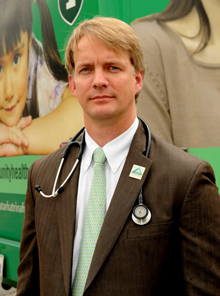Post-Katrina Lessons Revisited
Local and national mental health experts will gather in New Orleans on Thursday (July 15) to discuss how strategies adopted to help Hurricane Katrina survivors can be used to reach those affected by the Gulf oil crisis.

At a conference on Thursday (July 15) organized by Dr. Benjamin Springgate of Tulane, mental health experts will talk about ways to help those affected by the Gulf oil crisis. (Photo by Sally Asher)
The REACH NOLA Behavioral Health Community Conference is scheduled from 8 a.m. to 4:30 p.m. at Tulane University School of Medicine, 1555 Poydras St. It will examine successful community-academic partnerships that emerged after the storm in response to an overwhelming need for mental health services in an area where one in three people had symptoms of post-traumatic stress disorder, depression and anxiety.
As the community faces another large-scale disaster, organizers will address how existing programs can be quickly retooled to reach those whose lives and livelihoods are affected by the oil disaster.
“This is the first public forum to date to have leading mental health providers, community members and policymakers both at the federal and state level all in one place to talk about what they are doing and what they should be doing for mental health services and the oil spill,” says Dr. Benjamin Springgate, executive director of community health innovation and research for Tulane's Office of Community Affairs and Health Policy.
The conference also will feature Lawrence Palinkas, an anthropologist from the University of Southern California who has extensively researched the psychosocial and mental health effects of the Exxon Valdez spill in Alaska.
“He is going to be relating his work to what is currently happening in the Gulf and what his recommendations are on how community members and policymakers can work together to tackle the problem,” Springgate says.
The conference is sponsored by Tulane, RAND Corp. and REACH NOLA, a nonprofit organization dedicated to improving health equity, community health and access to quality health care through partnered programs, services and research. The conference is free, but it is open only to those involved in local, regional or national organizations dealing with mental health services.
